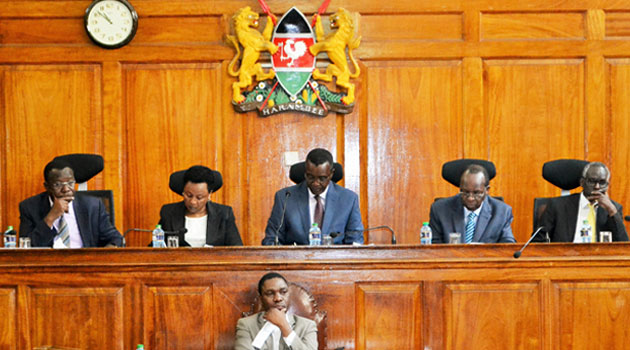
The other argument that Chief Justice David Maraga and the Supreme Court bench is set to make a determination on in its detailed ruling is whether or not there ought to have been fresh nominations preceding the October 26 poll/FILE
NAIROBI, Nov 22 – The “October no elections” clamour by the main Opposition alliance was perhaps based on a misapprehension of Article 138 (2) of the Constitution which requires a presidential election to be held in all the 290 constituencies countrywide.
Following the Supreme Court ruling on Monday which upheld President Uhuru Kenyatta’s re-election during the October 26 presidential poll, the focus is now on the apex court which is set to issue a detailed verdict on its ruling early December, a decision that could usher a new dawn in the country’s electoral dispensation.
According to lawyer Elias Mutuma, the constitutional imperative of Article 138 (2) was to ensure that the electoral commission goes out of its way to organize elections in all parts of the country but the poll agency could not take the blame if the elections are disrupted by political players.
Speaking to Capital FM News on Tuesday, Mutuma said the contention is one of the issues that the apex court is likely to resolve in a detailed ruling going by the fact that it was one of the most extensively debated by parties in the two petitions that sought the invalidation of President Kenyatta’s re-election.
“When that Article states that an election must be held in all the constituencies, my opinion is that as long as the electoral commission organizes elections in those constituencies and puts mechanism to ensure elections take place then they’ve discharged their constitutional duty,” he said.
Mutuma who represented Thirdway Alliance presidential candidate Ekuru Aukot as an interested party in the petitions – one filed by former Kilome MP Harun Mwau, and the other by activists Njonjo Mue and Khelef Khalifa – argued the ruling by the top court will serve to protect future elections from sabotage by politicians.
“You cannot punish the electoral agency that organises elections and they fail to happen due to factors it had no control on. You cannot also punish a person who won the election in other areas based on the fact that someone ensured there were no elections in other areas,” he stated.
According to Mutuma, the inability to conduct the presidential election in 25 constituencies in Nyanza region would be inconsequential if the Independent Electoral and Boundaries Commission (IEBC) is not found culpable of intentionally depriving the voters in the region their right to participate in the election.
The other argument that Chief Justice David Maraga and the Supreme Court bench is set to make a determination on in its detailed ruling is whether or not there ought to have been fresh nominations preceding the October 26 poll.
The ruling of the court on this issue is also expected to put to rest the contention on fresh nominations following a nullification of a presidential election under Article 140.
The lack of reference to fresh nominations under Article 140 (3) which is what the Supreme Court invoked on September 1 when it nullified the August 8 presidential poll meant that processes preceding an annulled election if not faulted by the court remained intact, Mutuma argued.
“Having agreed to uphold the election, my thinking is that the judges deemed unnecessary to have nominations before the election was held.”
Mutuma further argued that IEBC was right in initial decision to include all candidates who took part in the annulled election except Cyrus Jirongo – a candidate who had been declared bankrupt.
The decision to include him in foresight of a possible court order lifting the bankruptcy, however, ought not to have been considered due to the strict timelines the commission was operating within.
Jirongo’s inclusion, however, may not have jeopardized the election since he did not garner a substantial amount of votes that would affect the outcome of the election, Mutuma said.
Mutuma pointed out that Jirongo’s candidature would have put the nation at crossroads had he garnered a substantial number of votes to affect the outcome of the election.
It was also Mutuma’s standpoint that the 2013 Supreme Court ruling never addressed the nomination question particularly with regards to the withdrawal of candidature by a presidential contender.
He said the issue did not arise as a matter of determination during the 2013 proceedings and hence could not have dictated the roadmap to the October 26 presidential election.
“The Supreme Court never addressed the issue of who would participate in a fresh election in the event one of the candidates in the election withdraws with finality,” Mutuma argued adding that for such a determination to have been made, one of the parties in the petition ought to have made a pleading with regards to the same.
Whereas Attorney General Githu Muigai made reference to the issue at the time (2013), he made no substantive submissions on the matter at the court before which he was appearing as amicus curiae.
Mutuma explained that the High Court ruling by Justice John Mativo on October 11 allowing Thirdway Alliance presidential candidate to contest in the fresh election was the first substantive pronouncement by the court on the matter.
He also cautioned against an amendment of the Constitution to resolve political contentions arising from the recently concluded election saying grey areas, if any, can instead be cured through subsidiary legislation by Parliament.
“The Constitution should not be prescriptive because it essentially is meant to provide a roadmap,” he said arguing that a move to amend the Constitution could jeopardize gains made since its adoption.
“The moment we open that door of amending the Constitution, we will water down key provisions because our politicians will take advantage and introduce clauses they deem friendly while deleting those they see as hostile,” Mutuma warned.









































